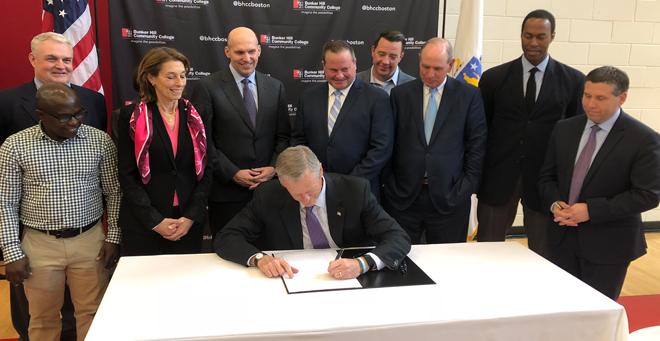 |
|
|
Massachusetts Gov. Charlie Baker signs the Life Science Bond Bill into law at Bunker Hill Community College on Friday, June 15. |
At a ceremony held at Bunker Hill Community College, Massachusetts Gov. Charlie Baker signed the Life Science Bond Bill into law on Friday, June 15, re-authorizing legislation that created the Massachusetts Life Sciences Center and that helped propel the commonwealth’s rise as a global leader in biomedical sciences research and development. The new legislation designates $463 million in new capital authorizations.
Gov. Baker signed the bill before an assembly of the state’s top life sciences leaders, including Chancellor Michael F. Collins, Massachusetts Life Sciences Center President and CEO Travis McCready, and Massachusetts Biotechnology Council President and CEO Robert Coughlin.
“The University of Massachusetts and UMass Medical School commend Governor Baker, Senate President Chandler, Speaker DeLeo and their respective teams for boldly committing to strategically invest in the commonwealth’s life sciences sector,” Chancellor Collins said. “Brainpower is the commonwealth’s greatest natural resource and nowhere is the abundance of this resource more apparent than in the life sciences, where university-based research and private sector innovation converge to transform therapies for patients and drive the economy of our home state.
“This prudent investment will fuel innovation and collaborative partnerships, thereby creating jobs while offering hope to the human condition by advancing treatments and cures for disease. The scope and quality of Massachusetts’ biomedical research cluster has become the envy of the world during the last decade and all of us at UMass Medical School look forward to continuing to contribute to this most meaningful mission.”
The legislation builds on the 10-year initiative launched by then-Gov. Deval Patrick in 2008 that pumped $1 billion into the state’s life sciences sector through the Massachusetts Life Sciences Center Capital Funding Programs. At UMass Medical School, the program provided a key initial investment to build the Albert Sherman Center, a state-of-the-art biomedical research and medical education building. It also helped to fund the High-Resolution Cryo-Electron Microscopy (the “Cryo-EM”) facility at UMass Medical School, the first of its kind in New England, which allows scientists to see single molecules in unprecedented detail.
While Gov. Baker will decide how to invest the capital authorizations over five years, the legislature earmarked $150 million for investments in research and facilities across the five campuses of the University of Massachusetts, including:
- $50 million for UMass Medical School and UMass Lowell to develop joint neuroscience resources that will advance neuroscience-related workforce training, translational research, and commercialization of devices and image-based diagnostics across the state. The funding will create the UMass-GE NeuroNexus Imaging Cluster, which will help increase researchers’ ability to image the brain and thus develop better diagnostics and new device therapeutics and drugs.
- $6 million for UMass Medical School to support the Center for Data-Driven Discovery and Health Care (D3Health), designed to revolutionize health care through mobile health and digital technologies, and stimulate the economic growth, workforce training and public health of Central Massachusetts. These technologies enable continuous remote and in-home monitoring of patients, minimize unnecessary emergency room visits and hospital stays, and improve patient and public health. Funding from this legislation will contribute to the creation of the Massachusetts Living Lab, a physical and virtual environment that will support the implementation and advancement of D3Health’s primary goals.
- $5 million for MassBiologics of UMass Medical School to support the development of a new biomanufacturing platform for cell and gene therapies at the MassBiologics SouthCoast Facility in Fall River. The addition of a modular continuous closed biomanufacturing platform will address one of the most pressing needs in the biomanufacturing sector. While there have been transformative advances in the development of a new class of cell and gene therapeutics, these new medicines will require the biomanufacturing sector to innovate targeted and tailored processes to manufacture these products at sufficient scale, location and quality.
Chancellor Collins said the Massachusetts Life Sciences Center’s investment in UMass Medical School brought the school’s already strong relationship with the life sciences industry to new levels, driving economic development and growth of the private life sciences industry in the Worcester region and across the state.
For example, since the Sherman Center opened, researchers there have attracted $376 million in external research grants, including $233.2 million from the federal government, mostly from the National Institutes of Health. A United for Medical Research report estimated that each $1 of investment by the NIH in Massachusetts has a multiplier economic impact of $2.30, which means the grants received by the scientists in the Sherman Center alone have had an $865 million impact on the Massachusetts economy. In addition, eight new companies have been established based upon research breakthroughs of scientists whose labs are located in the Sherman Center. Sherman Center researchers have also produced approximately 70 new inventions and invention disclosures.